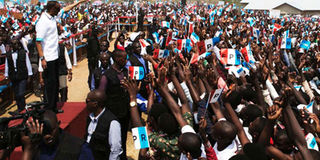Congo, Rwanda polls a mere formality

Rwandan president Paul Kagame greets supporters in Ruhango district during his re-election campaign on July 14, 2017. Having never faced credible opponents, he still has no serious challengers on August 4. PHOTO | CYRIL NDEGEYA | AFP
What you need to know:
- The first day of the Rwandan poll is reserved for the country’s diaspora, estimated to number about 40,000.
- Also holding legislative polls Sunday is Senegal, where candidates will be vying for the 165 National Assembly seats.
This weekend was to be a particularly exciting one in the African electoral calendar, with parliamentary polls slated for Gabon, Senegal and Congo Brazzaville.
While Gabon was to hold its long-awaited parliamentary polls Saturday, the Republic of Congo was poised for the second round of the legislative and local government ones.
The first round of the parliamentary polls in the latter country was held on July 16.
CANDIDATES
More than 700 candidates contested for the 151 seats in the National Assembly, usually dominated by the Congolese Labour Party or PCT.
In the meantime, 80,000 others vied for 1,158 local council positions.
Pointedly, PCT had 128 people gunning for parliamentary seats.
Pan-African Union for Social Democracy (Upads), the main opposition party, only fielded 43 candidates.
ELECTION RESULTS
After its victory in the 2016 presidential election, the ruling party and its affiliates won a majority of seats in the local and legislative polls.
It took 450 seats out of 1,158 up for grabs in local council contest.
In a country where President Dénis Sassou-Nguesso’s cronies routinely call the political shots, the results of Sunday’s final round are equally predictable.
POSTPONED
In fact, many observers view Sunday’s elections as cosmetic, and whose results are expected to anger an already frustrated opposition.
In Gabon, the parliamentary polls that were to be held Saturday came to a cropper after yet another postponement at the eleventh hour.
Significantly, the planned polls in the two Francophone countries were expected to act as a curtain raiser for the presidential election in Rwanda on Thursday and Friday.
PAUL KAGAME
The first day of the Rwandan poll is reserved for the country’s diaspora, estimated to number about 40,000.
The real action will however be in Rwanda itself on Friday with President Paul Kagame expected to romp home without problems.
Having been in power since 2000 after taking over from Pasteur Bizimungu, 59-year-old Kagame already ranks among Africa’s longest-serving leaders.
He is among a clique that has been manoeuvring for multi-term tenures, with no telling when they will quit.
TERM LIMIT
Like other African champions of the multi-term concept, Kagame first did away — through a 2016 referendum — with a constitutional limit to presidential terms.
Having never faced credible opponents, he still has no serious challengers on August 4.
His opponents — Frank Habineza and Philippe Mpayimana — are stark underdogs not expected to as much as dent the incumbent’s chances of winning with a landslide.
OPPONENTS
Now that Kagame is practically assured of victory, he will theoretically be in a position to clutch onto the position until 2034.
This means that by the time he quits, Kagame might have been in power for 40 years, amid claims of his presumed unassailability in the country’s political set-up.
Still, queries abound regarding whether Kagame survives in power by ruthlessly dealing with his rivals.
MACKY SALL
Also holding legislative polls Sunday is Senegal, where candidates will be vying for the 165 National Assembly seats.
The election is widely viewed as a referendum on the government of Macky Sall ahead of a presidential election in 2019.
The postponement of Gabon’s legislative polls to a date cited as somewhere in April next year is not surprising.
GABON
In fact, the postponement is symptomatic of a malaise that has reigned in the country since the violence-ridden presidential election in August 2016.
The bruising poll pitted incumbent and current President Ali Bongo Ondimba against former African Union Commission chairman Jean Ping.
The results were controversial and even comical, with Bongo claiming to have won 95 per cent of the ballots on a 99.9 per cent turnout in his native Haut-Ogooue province.
JEAN PING
Even with that, President Bongo who assumed office in 2009 upon the death of his father Omar Bongo — a man who had been in power for 42 years — was re-elected by less than 6,000 votes.
Predictably, an implacable and combative Ping refused to accept the results and even went as far as declaring himself the legitimate president, a position he still holds onto.





